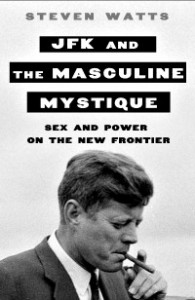Nonfiction on Study Skills, Healthy Baking, JFK & Masculinity | Xpress Reviews
Week ending August 12, 2016
Help Your Kids with Study Skills: A Unique Step-by-Step Visual Guide. DK. Jun. 2016. 256p. illus. index. ISBN 9781465436344. pap. $19.95. CHILD REARING
True to the DK brand of producing glossy texts with full-color photos, this volume begins with an introductory chapter on “How We Learn” and covers such subjects as how the brain works and a variety of learning styles. Further sections address topics including preparing and setting goals, reviewing techniques, and handling anxiety while providing tips on notetaking, memory aids, presentation skills, and avoiding plagiarism, all displayed on vibrant two-page spreads.
Verdict The visual presentation of DK books usually lends a great deal to their approachability and readability, but this title, unfortunately, falls short. There’s simply too much happening on a single page, with little orientation or organization, which makes this feel more like a haphazard graphic novel than a volume addressing structure and habit.—Julianne Smith, Ypsilanti Dist. Lib., MI
Hertzberg, Jeff & Zoë François. The New Healthy Bread in Five Minutes a Day. Thomas Dunne: St. Martin’s. Nov. 2016. 432p. photos. index. ISBN 9781250077554. $32.99; ebk. ISBN 9781466889767. COOKING
An updated edition of the 2009 book Healthy Bread in Five Minutes a Day, this latest by Hertzberg concentrates on quick yet healthy recipes that use whole grain flour and oil instead of white flour and margarine or butter. The introductory chapters offer advice on ingredients, equipment, tips, and techniques, while the rest of the book is divided into chapters by type of bread: whole grain, those with fruits and vegetables, pizza and flatbreads, and gluten-free breads and pastries. Most recipes recommend the use of vital wheat gluten to make bread less dense. Although there is one page for each recipe, helpfully situated in a box format with columns for ingredient, volume, and U.S. and metric weight, avid home chefs may miss the anecdotes and personal writing of some cookbooks.
Verdict Recommended for public libraries that have users interested in the latest ideas of bread baking. [For more baking ideas, see “Our Just Desserts,” Collection Development, LJ 9/1/16, p. 44–46.—Ed.]—Christine E. Bulson, Emeritus, Milne Lib., SUNY Oneonta
Watts, Steven. JFK and the Masculine Mystique: Sex and Power on the New Frontier. Thomas Dunne: St. Martin’s. Nov. 2016. 432p. notes. index. ISBN 9781250049988. $29.99; ebk. ISBN 9781466851153. SOC SCI
 This work by Watts (history, Univ. of Missouri; Mr. Playboy: Hugh Hefner and the American Dream) has a similar feel to Mark White’s Kennedy: A Cultural History of an American Icon (2013) as it attempts to look at the philosophical and cultural currents that surrounded the rise of President John F. Kennedy (1917–63). The focus is on Kennedy’s celebrity, with the author highlighting the senator’s timely arrival as he crested the cultural wave and rode it into the presidency with promotion from such well-known individuals as Frank Sinatra, Norman Mailer, and Hugh Hefner. Much of the work creates an interchange between Kennedy as a central figure and other iconic men of the period and connects them to the perceptions of masculinity during the beginning of the sexual revolution of the Sixties and the corresponding rise of feminism. The many references to publications from that time greatly aid in re-creating the flavor and feel of the era.
This work by Watts (history, Univ. of Missouri; Mr. Playboy: Hugh Hefner and the American Dream) has a similar feel to Mark White’s Kennedy: A Cultural History of an American Icon (2013) as it attempts to look at the philosophical and cultural currents that surrounded the rise of President John F. Kennedy (1917–63). The focus is on Kennedy’s celebrity, with the author highlighting the senator’s timely arrival as he crested the cultural wave and rode it into the presidency with promotion from such well-known individuals as Frank Sinatra, Norman Mailer, and Hugh Hefner. Much of the work creates an interchange between Kennedy as a central figure and other iconic men of the period and connects them to the perceptions of masculinity during the beginning of the sexual revolution of the Sixties and the corresponding rise of feminism. The many references to publications from that time greatly aid in re-creating the flavor and feel of the era.
Verdict Very narrowly focused on the idea of masculinity using Kennedy and company as a test case for cultural commentary. Those looking for period studies related to American culture during the 1950s and 1960s should find this work intriguing.—Mark Hanson, Maranatha Baptist Univ. Lib., Watertown, WI
RELATED
ALREADY A SUBSCRIBER? LOG IN
We are currently offering this content for free. Sign up now to activate your personal profile, where you can save articles for future viewing









Add Comment :-
Comment Policy: